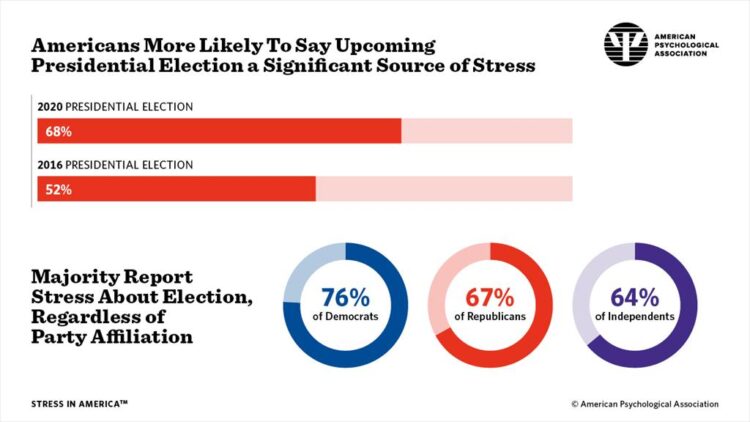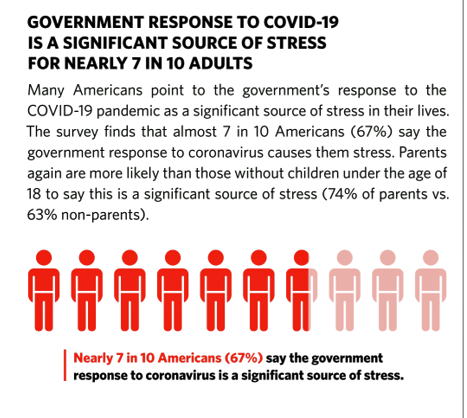 If you perceive you are more stressed in the COVID-19 pandemic than you were in 2019, you are one in many millions feeling so.
If you perceive you are more stressed in the COVID-19 pandemic than you were in 2019, you are one in many millions feeling so.
If you felt stressed during the 2016 Presidential election season, you were also one in a million.
Now, as the 2020 Election converges with the coronavirus crisis, even more Americans are feeling significant stress in a double-whammy impact.
Our friends at the American Psychological Association have assessed Stress in America for many years of studies. The latest, published 7
Two in three U.S. adults told APA that the presidential election this year is a significant source of stress, compared with 52% of people citing political stress during the 2016 election which I covered here in Health Populi.
 While most Americans across party affiliation feel this political stress in 2020, even more Democrats than Republicans and Independents have stress about the U.S. election: that is 76% of Dems, and two-thirds each of Independents and Republicans.
While most Americans across party affiliation feel this political stress in 2020, even more Democrats than Republicans and Independents have stress about the U.S. election: that is 76% of Dems, and two-thirds each of Independents and Republicans.
Importantly — and especially “acutely” impactful in this moment as the U.S. Supreme Court will be considering the case of California v. Texas involving the overturn of the Affordable Care Act — more Americans managing a chronic health condition are more likely to feel political stress in 2020 than people who do not have a chronic condition.
Health Populi’s Hot Points: In June 2020, I wrote about the APA’s Stress in America study which focused in on the COVID-19 pandemic and social justice, just days after the death/murder of George Floyd.
In the 2020 pandemic summer, two-thirds of Americans said the U.S. government response to the coronavirus public health crisis was a significant source of stress to them. This stress was felt especially keenly by parents with children under 18 years of age compared with people that didn’t have kids at home.
APA noted that, “The COVID-19 pandemic has altered every aspect of American life, from health and work to education and exercise.” That was in Wave 1 of the study which finished fielding the survey on May 4.
What a difference three weeks made: 21 days later, George Floyd was killed by police in Minneapolis.
“This event set off weeks of protests over police violence and racism both across the country and around the world,” APA’s report on Wave 2 research for this report began. APA polled 3,013 U.S. adults age 19 and over between May 21 and June 3, 2020, and a third study about civil unrest between June 9-11, 2020, to complement their original research plan based on the next pandemic emerging after COVID-19 and an economic recession: social unrest and civil rights re-awakening.
 This third bar chart tells the sad stress story of Americans mid-summer, compared with how people felt in 2017 and 2019.
This third bar chart tells the sad stress story of Americans mid-summer, compared with how people felt in 2017 and 2019.
Some 7 in 10 Americans said that “this,” right now, was the lowest point in history they could remember, versus 56% and 59% in 2017 and 2019, respectively.
Clearly, U.S. voters already starting to cast their vote for the next American President in states enabling early voting are viewing this year’s Presidential race in this anxious, stressed-out, context.
I will be covering more about the APA Stress in America study next week, but wanted to share this over-arching data point with Health Populi readers as soon as I received it.




 Thank you FeedSpot for
Thank you FeedSpot for